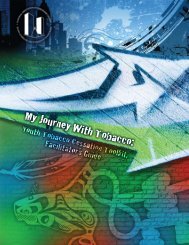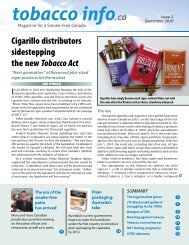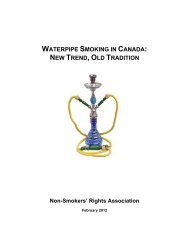Tobacco-Free Sports and Recreation Policies
Tobacco-Free Sports and Recreation Policies - New Brunswick Anti ...
Tobacco-Free Sports and Recreation Policies - New Brunswick Anti ...
Create successful ePaper yourself
Turn your PDF publications into a flip-book with our unique Google optimized e-Paper software.
<strong>Tobacco</strong>-<strong>Free</strong> <strong>Sports</strong> <strong>and</strong> <strong>Recreation</strong> <strong>Policies</strong><br />
Spectator Surveys<br />
For Case Study I, the PHU collected surveys (n=50) at one home game (youth staff assisted) in<br />
December 2011. Fifty-four per cent of of the 50 spectator survey respondents were male, 46%<br />
were female. Their ages ranged from 16-19 years to 65+ years, with the most common age group<br />
40-49 yrs. Almost all (n=48, 96%) of the spectators had completed high school or university. Of<br />
the two that had not completed high school, one male was aged 16-19 years (still in school) <strong>and</strong><br />
one (male) was aged 65 years+. Most reported their role as either a parent (n=39) or another<br />
relative of a player (n=8). One player, one “spectator” without a relation to team members <strong>and</strong><br />
one friend of player were also reported. The majority of surveyed spectators (n=47, 94%)<br />
attended hockey events (games/ practices) on a weekly basis, two were monthly attendees.<br />
More than half of the respondents (n=30, 60%) lived in the community.<br />
Findings<br />
Rationale for TFSR Policy Development<br />
All participants in this evaluation were asked to reflect on the rationale or reasons for developing<br />
a TFSR policy for their hockey team(s). A few participants felt that the $500 PLBTF seed grant 5<br />
was an important incentive for the team, especially when faced with the challenge to raise extra<br />
funds for team uniforms (jerseys <strong>and</strong> work-out gear).<br />
Number one incentive obviously is money. <strong>Sports</strong> [Laugh] teams are constantly<br />
looking for funding to support the needs of their team--so that was a good fit.<br />
When they looked at what the requirements were within this grant application--<br />
there wasn’t a lot of work to be done <strong>and</strong> it was a good fit within their sport<br />
because really tobacco <strong>and</strong> sports don’t mix-so when it came to having to<br />
implement the policy with the age groups that we were working with--it really, it<br />
was more a role modeling piece <strong>and</strong> education to the kids but it wasn’t that anyone<br />
would potentially be cut from a team because at that age they’re not using tobacco<br />
yet. (PHU Key Informant)<br />
According to another PHU informant <strong>and</strong> one team coach, the teams decided to develop the TFSR<br />
policy in part by what they had personally witnessed at the higher levels of hockey in the<br />
community: players who regularly <strong>and</strong> openly used chew tobacco. The local Junior-level team had<br />
5 Through an application process, PLBTF seed grants were provided to a number of sport teams <strong>and</strong> recreational groups<br />
across Ontario to create <strong>and</strong> promote a tobacco-free policy.<br />
Ontario <strong>Tobacco</strong> Research Unit 15





